 You already know olive oil is the healthy choice for you, but it shouldn’t be the only oil you keep in your kitchen. Which oil is suitable for sautéing, baking, dressings or deep frying? What’s the best cooking oil when I want to dish up a quick stir-fry in my wok? What about for spicy curries? How do I choose the right cooking oils suitable for my family’s health, nutritional needs, life-style choices and taste preferences? I compare 10 different cooking oils, and share why I have four different oils in my kitchen.
You already know olive oil is the healthy choice for you, but it shouldn’t be the only oil you keep in your kitchen. Which oil is suitable for sautéing, baking, dressings or deep frying? What’s the best cooking oil when I want to dish up a quick stir-fry in my wok? What about for spicy curries? How do I choose the right cooking oils suitable for my family’s health, nutritional needs, life-style choices and taste preferences? I compare 10 different cooking oils, and share why I have four different oils in my kitchen.
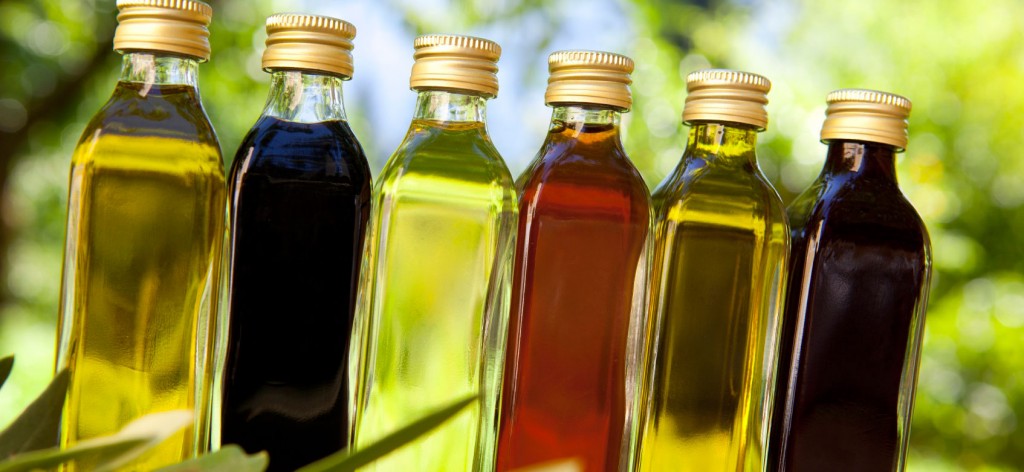
1. Olive Oil
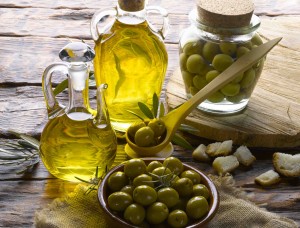 Olive oil is high in omega-3 fatty acids, a.k.a., ‘good fat,’ and has many health benefits. It is a cold-pressed oil because it cannot withstand high heat, lest it oxidise. To get the most benefit, use olive oil raw or heated at low temperature. I usually use olive oil for salad dressings and western-style cooking which generally requires lower heat compared to Asian cooking. I choose extra virgin (a.k.a., EVOO) as I prefer the taste, but virgin is also fine. When purchasing olive oil, do compare brands as there are apparently ‘fake’ virgin olive oils on the market.
Olive oil is high in omega-3 fatty acids, a.k.a., ‘good fat,’ and has many health benefits. It is a cold-pressed oil because it cannot withstand high heat, lest it oxidise. To get the most benefit, use olive oil raw or heated at low temperature. I usually use olive oil for salad dressings and western-style cooking which generally requires lower heat compared to Asian cooking. I choose extra virgin (a.k.a., EVOO) as I prefer the taste, but virgin is also fine. When purchasing olive oil, do compare brands as there are apparently ‘fake’ virgin olive oils on the market.
2. Coconut Oil
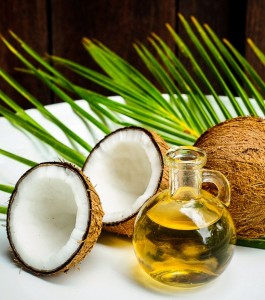 Coconut oil is a very healthy oil and considered a ‘good fat.’ It is my favourite oil, but not as a cooking oil. I take extra virgin coconut oil orally. While I love the taste of raw coconut oil, I don’t like to cook with it because I can’t stand coconut oil’s smell or taste when it’s heated. But many health-conscious people use coconut oil as a cooking oil.
Coconut oil is a very healthy oil and considered a ‘good fat.’ It is my favourite oil, but not as a cooking oil. I take extra virgin coconut oil orally. While I love the taste of raw coconut oil, I don’t like to cook with it because I can’t stand coconut oil’s smell or taste when it’s heated. But many health-conscious people use coconut oil as a cooking oil.
It is also a cold-pressed oil because it cannot withstand high heat. However, it is more stable than olive oil and can thus be heated up to higher temperatures than olive oil. It is suitable for sautéing and light frying. Please read my blog The Miraculous Fat that Nourishes the Brain and Heals the Body! Why Coconut Oil Is Good for You.
However, I do use coconut oil in heat-free cooking, such as when I make Bulletproof coffee, and to make these ridiculously yummy melt in your mouth Paleo homemade chocolate candy. For the recipe, click here.
3. Ghee
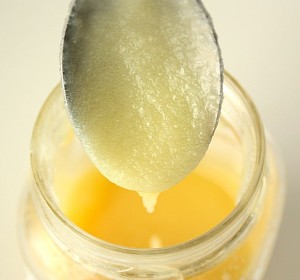 Ghee is clarified butter. The process of clarifying the butter removes the casein. It is suitable for those who are lactose intolerant, on a dairy-free or casein-free diet. Ghee is easily available and affordable. Use organic ghee if you can find it.
Ghee is clarified butter. The process of clarifying the butter removes the casein. It is suitable for those who are lactose intolerant, on a dairy-free or casein-free diet. Ghee is easily available and affordable. Use organic ghee if you can find it.
Here in Malaysia, I use ghee from Australia or New Zealand as it is commonly available. Also, I believe it is healthier. Australian and New Zealand dairy cows are generally grass-fed, not grain-fed. As you know, grass fed is always better than grain fed. You can make your own ghee too by using good grass-fed butter.
Ghee is also a good substitute for butter in certain recipes. Ghee is generally used in Indian recipes, great I also use it for sautéing, it brings amazing flavour to briyani rice, curries and thosai. Plus, I love the taste. Just add a dollop of ghee to hot, freshly cooked rice and stir, it makes a wonderful accompaniment for many meals. It is considered a good fat by many nutritionists including Julie Matthews, certified autism nutrition expert. Please read her article Ghee – Rich In Nutrients And Casein Free.
4. Sunflower Oil
I have mad wok skills. I cook a lot of Asian food at home, which requires very high heat. If my wok isn’t sizzling and smoking, you just know the food isn’t going to taste as good. Sunflower oil has a very mild taste, it has a high smoke point, it is stable at high temperatures and doesn’t oxidise. I use sunflower oil in moderation, for Asian style flash frying and the occasional deep frying. When compared to olive oil, coconut oil and ghee, I wouldn’t really say it’s a ‘healthy’ oil; however, it may be a better option compared to other refined oils. When used in moderation combined with a healthy, nutritionally dense diet, I find using sunflower oil occasionally is fine for my family. But I must admit, I tuck the bottle of sunflower oil at the very back of the cupboard when crunchy-mama friends come a calling!
5. Canola Oil
I prefer to avoid canola oil. It is extracted from rapeseed, but they renamed and rebranded it to make is sound more palatable to consumers. There’s no such thing as a canola plant. Canola oil is a refined oil, and utilises toxic chemicals during the production process: Hexane, sodium hydroxide and bleach. Please watch this video of how canola oil is made.
If you are unable to view the video, click here.
6. Corn Oil
 I try to minimise corn-based products as much as I can. Corn is well known as being a genetically modified crop. I go GMO-free when possible. Plus, many children on the autism spectrum have issues digesting corn-based products. And in the processed foods world, HFCS (high fructose corn syrup, also a corn product) is overused and causes so many health issues.
I try to minimise corn-based products as much as I can. Corn is well known as being a genetically modified crop. I go GMO-free when possible. Plus, many children on the autism spectrum have issues digesting corn-based products. And in the processed foods world, HFCS (high fructose corn syrup, also a corn product) is overused and causes so many health issues.
7. Soybean Oil
Soy is another genetically modified crop. Most soy is GMO. And many children on the spectrum present extremely high intolerance to soy. I have seen many food intolerance test results (IgG antibodies) of children with autism. In 90 out of 100 test results I see, the children have off-the-charts intolerance to soy, even worse than to casein or gluten. My children were on a completely soy-free diet. Now, the only type of soy we consume is fermented soy. Thus, soybean oil is a “no” for me.

8. Palm Oil
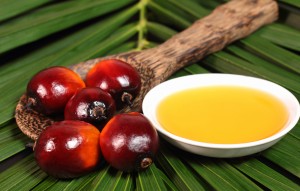 Malaysia is one of the largest palm oil producers in the world. Palm oil is affordable and plentiful here. It is commonly used in most kitchens in Malaysia. I grew up with palm oil, I believe that as a cooking oil, it is relatively fine when used in moderation. Some western health advocates believe that palm oil is bad for cholesterol and can negatively affect your health. However, based on the studies I have read which are not biased towards the GMO-led food conglomerate, I feel that palm oil is healthier than canola oil, corn oil or soybean oil. However, my husband, having grown up in Australia, prefers to avoid palm oil due to anti-palm oil controversy. Thus, we compromised and settled on sunflower oil for high-heat cooking.
Malaysia is one of the largest palm oil producers in the world. Palm oil is affordable and plentiful here. It is commonly used in most kitchens in Malaysia. I grew up with palm oil, I believe that as a cooking oil, it is relatively fine when used in moderation. Some western health advocates believe that palm oil is bad for cholesterol and can negatively affect your health. However, based on the studies I have read which are not biased towards the GMO-led food conglomerate, I feel that palm oil is healthier than canola oil, corn oil or soybean oil. However, my husband, having grown up in Australia, prefers to avoid palm oil due to anti-palm oil controversy. Thus, we compromised and settled on sunflower oil for high-heat cooking.
9. Peanut Oil
 Also known as groundnut oil, peanut oil is a highly refined oil and is slightly higher in saturated fats compared to other oils. It has a high smoke point and is suitable for deep frying. People with peanut allergy should avoid it completely.
Also known as groundnut oil, peanut oil is a highly refined oil and is slightly higher in saturated fats compared to other oils. It has a high smoke point and is suitable for deep frying. People with peanut allergy should avoid it completely.
10. Rice Bran Oil
Is the oil extracted from the germ and inner husk of rice. I eat a predominantly Malaysian diet, meaning, I eat rice often, sometimes 2, even 3 times a day. Thus, there is really no real reason why I should add more rice-based products to my already rice-heavy diet. Though rice bran oil is generally regarded as a healthier option, it is high in omega-6 fatty acids and very low in omega-3s. For optimum health, we need a 1:1 ratio of omega-3 to omega-6 fatty acids. Most people are too high in omega-6s already.
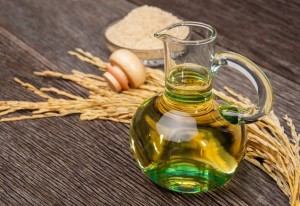 Latest estimates show most people have an omega-6 to omega-3 ratio of 10 to 1! This is worrying indeed as high levels of omega-6 fatty acids increase inflammation. Thus, you need to balance it with foods that are high in omega-3s. Children with autism and learning challenges benefit from omega-3, as they provide EPA and DHA. DHA supports cognition and brain function. EPA helps with inflammation and mood regulation. Please read my blog Fish Oil for Autism: EPA, DHA and the Lowdown on Omega 3.
Latest estimates show most people have an omega-6 to omega-3 ratio of 10 to 1! This is worrying indeed as high levels of omega-6 fatty acids increase inflammation. Thus, you need to balance it with foods that are high in omega-3s. Children with autism and learning challenges benefit from omega-3, as they provide EPA and DHA. DHA supports cognition and brain function. EPA helps with inflammation and mood regulation. Please read my blog Fish Oil for Autism: EPA, DHA and the Lowdown on Omega 3.
Besides ghee, there are other animal fats that may be used as cooking oils. Goose fat and duck fat are great for those on the GAPS diet, Body Ecology Diet and Paleo Diet. Lard comes from pigs and may not be suitable for some people due to religious beliefs, and animal fats are not suitable for vegetarians and vegans. Animal fats may not suitable for people who are at significant risk of high cholesterol.
In my kitchen, I have extra virgin olive oil, extra virgin coconut oil, sunflower oil and ghee. What are YOUR favourites?
Happy cooking everyone!
~ Dragon Slayer
About the author – Dragon Slayer is a mother of two children who are recovered from autism. She is the co-author of Autism Beyond the Spectrum, the vice-president of The Thinking Moms’ Revolution, and the co-founder of Brightstars – Life Skills For Exceptional Kids, a holistic school for children with autism, ADHD and learning challenges. She lives with her husband and children in Kuala Lumpur, Malaysia. For more blogs by Dragon Slayer, CLICK HERE.







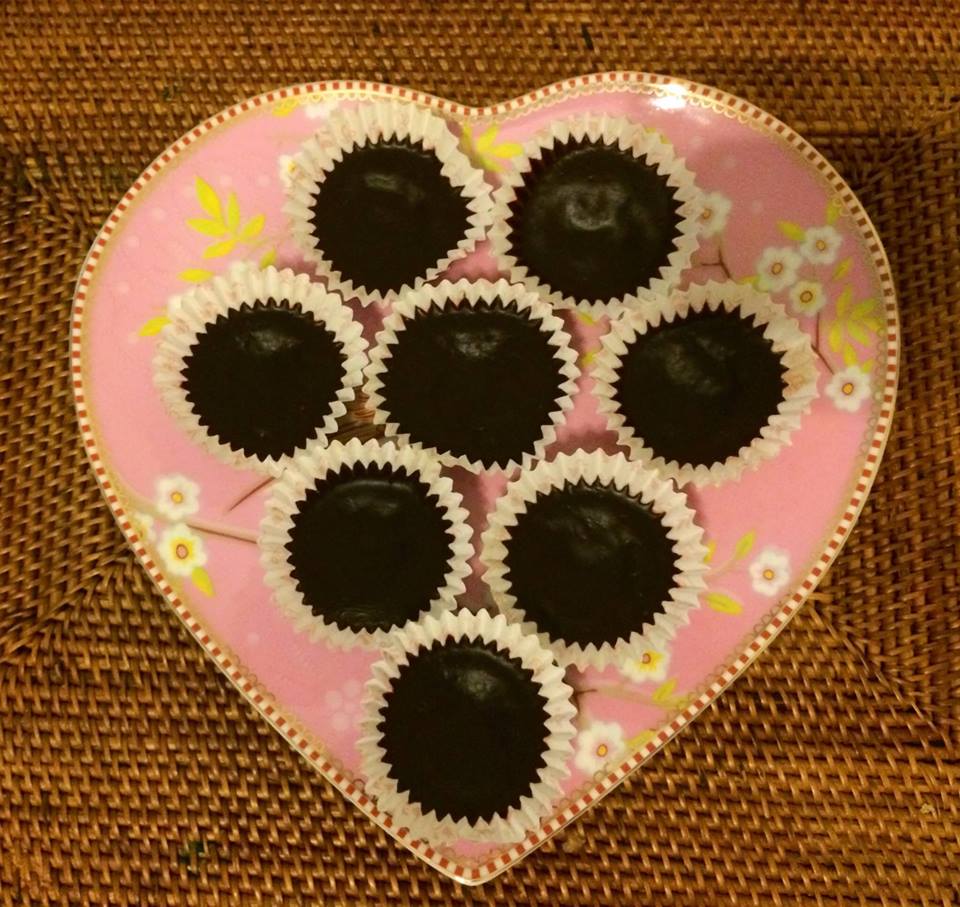










Thanks for comparing 10 healthy cooking oil and sharing its review have a look at
Marachekku Oil In Chennai
Cold Pressed Oil In Chennai
Chekku Ennai In Chennai
Gingelly Oil Price In Chennai
Thanks for sharing the oil that can be used in cooking we can also use groundnut oil for cooking. Today we can find Cold Pressed Groundnut Oil Bangalore
Pure coconut oil in Chennai
I have used To purchase Cold pressed groundnut oil and I am very much satisfied with it’s own nature and very useful for human. I recommend this is Really, very good product in the market.
So….after reading a couple of websites re..healthy cooking oils, you all contradict one another….no wonder people get confused….its so dam frustrating…who and what too believe…health and nutritonists cant agree…
I have to agree with you there, Merrille. I think that’s because, in many cases, we don’t actually know the properties of what constitutes “healthy.” For many years people thought polyunsaturated was the way to go, like in margarines. But margarines usually contain hydrogenated oils which more and more research is showing is an absolute nightmare for the body. It’s important to take everything with a grain of salt and to use your sense. The best book I’ve found on all food categories is The Dirt Cure by Dr. Maya Shetreat-Klein. She includes EVERYTHING in her overviews, science, history, ethics, etc.
Yes I agree Completly, Just tell us WHAT THE BEST OIL IS OVERALL? PLEASE
Coconut Oil for frying. Very good stuff in it. I think some specific fatty acids also found in human breast milk.
Olive oil in dressings/dips etc.
I think a little rice bran is fine too for cooking. Just be mindful to get your omega 3s elsewhere.(bitter greens in salad,fish, grass fed meat).
Use all oil sparingly when cooking.
Oh do NOT cook with olive oil.
Clings to free radicals which are bad news.
I fully agree with you Mirrelle. The article is shallow with confusing statements and unestablished inputs. I am more confused now about oils after reading this article.
Dear Sir/Madam,
How are you doing,
We are interested in purchasing your products and we sincerely hope to
establish a long-term business relationship with your esteemed company.
Please kindly send me your latest catalog. Also, inform me about the delivery time or FOB, and payment terms and warranty.
Your early reply is highly appreciated as we are urgently in need of this order.
Thank You!
Best Regards,
Eric Morgan
President/CEO
Carisco Tradings Ltd.
Address 2148 Alaska Ave,
Dawson Creek BC V1G4H3 Canada
Phone +1250-782-4448
Email: [email protected]
Hi Eric, we appreciate the interest, but we don’t have products to sell. We just provide information.
Key here is SMOKING POINT. The lower the smoking point the faster the oil turns black and become unusable. Olive oil has a low smoking point. There fore cannot be used in deep frying or any cooking method that requires the browning of food. High smoking point oils ideal for deepfrying are clarified butter and peanut oil
We prefer Rice Brand oil always which is good for health. http://www.sanjayvegoil.com
Coconut oil is actually very bad for you. It’s mainly saturated fats, which increase LDL cholesterol. It increases your risk of cardiovascular disease as well. Lipids are made up of two hydrocarbon tails, and they’re very important for our cells. The tail can be either unsaturated (contain cis double bonds – good for kinking them) or saturated (no double bonds), or trans (contain trans double bonds). These last two pack together, which is very dangerous and lead to clogged arteries.
While coconut oil is fantastic for your hair and skin, ingesting it is very unhealthy.
Sources: BSc biochemistry, heart.org
Wow, Em, that is OLD information. Yes, coconut oil is mainly saturated fat, but it has come to be recognized in recent years that that is not the bad thing it used to be considered. (Witness the “Eat Butter” cover of Time Magazine. http://time.com/2863227/ending-the-war-on-fat/)
In order to avoid the scenario you have mentioned it is important to avoid trans fat, NOT saturated fat. The more recent information on coconut oil is that there are a host of health benefits to consuming coconut and coconut oil:
http://authoritynutrition.com/top-10-evidence-based-health-benefits-of-coconut-oil/
http://www.doctoroz.com/article/surprising-health-benefits-coconut-oil
http://www.medicalnewstoday.com/articles/282857.php
Seriously, you quote doctor oz – a well known crackpot. There goes any credibility you might think you have.
As for canola oil, it is a bred plant (not GMO). It is widely known (scientifically) as an excellent choice. Your comments seem a touch irrational.
Love it! Dr. Oz is a “well known crackpot.” 😀 Yeah, I’m guessing anyone who doesn’t toe the mainstream medicine party line (and is therefore not 30 years behind) is an automatic “crackpot” or — let’s just go there, shall we? — “quack” to you, right? Let me break it to you gently, I’m not even the tiniest bit concerned what “credibility you might think” I have. (By the way, I have to say that I find it hysterical that I ALSO cite Time Magazine — it doesn’t get more “mainstream” than that — and “medical news today” with an article FILLED with scientific studies, and YOU choose to jump on Dr. Oz because he agrees with them without ever contesting a SINGLE point. Anyone else seeing why I don’t care what this guy thinks of my “credibility”?)
As for canola oil, according to this very pro-GM site, it is indeed genetically modified: http://www.gmo-compass.org/eng/grocery_shopping/crops/21.genetically_modified_rapeseed.html. Margarine, too, was “widely known (scientifically) as an excellent choice” right up until the moment when the mainstream scientific community acknowledged that overwhelming scientific evidence indicated that it was making people sick. The “crackpots” and the “quacks” had been reading that evidence as it came out and knew that a good 30 years before. There is nothing the slightest bit “irrational” about my comments, I’m just way ahead of your curve.
Does that mean that I think this blog or my current knowledge is the last word on cooking oil? Hell, no! I’m aware that new information is coming out all the time, and I take it in. Twenty years ago, I was all over the hot new “wonder oil” — canola! But we know much more about fat metabolism and fat oxidation now than we knew then.
I just discovered this website, not a beat too late, while reviewing the cooking oils reading this passage I had flashbacks to my biology courses. The double bond information. Either Fried or crunchy foods great taste and texture….I too do the moderation thing.
What about medium chain fatty acids?
Which coconut oil is full of.
You shouldn’t use.much of any oil when cooking.
We used to fried our food using lard before they gave it a bad name.
Awesome for me with my parents it was called Dripping? I’m a late comer here but still very interested? as in my experiance every decade or so things change? Avacodos were once so high in fats we were warned against them, now they are healthy? & now duck fat & lard is in ? what the f *** is it with you guys is it healthy or not or are you scared to view your point in case of being suied?
A wonderful book for fats information is Know Your Fats by Mary Enig. Just some info, cholesterol is not the villain it is made out to be. Animal fats are great for higher heat because they are saturated fat. Coconut oil is good for higher temps as well.
We use a combo of grapeseed oil (mostly for using with essential oils, but also deep frying and some high heat frying), avocado oil, olive oil & coconut oil.